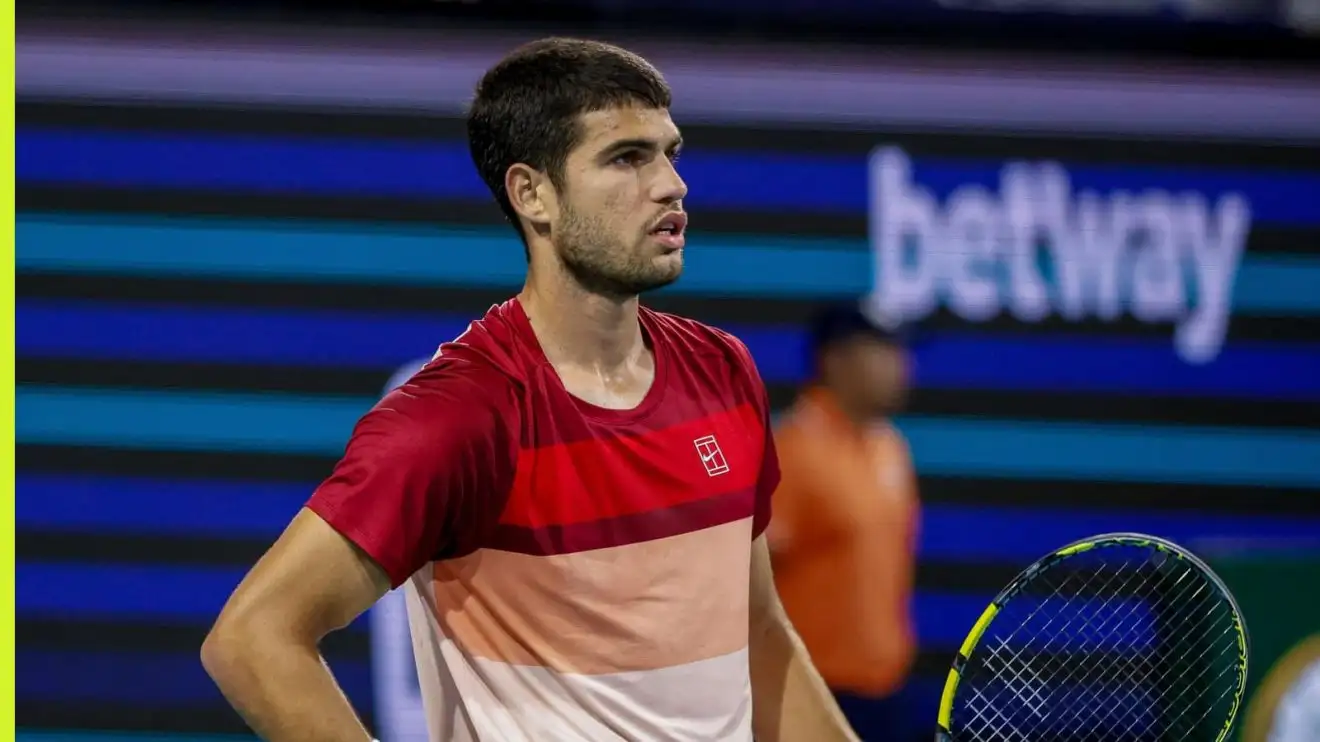
Carlos Alcaraz, the 21-year-old tennis prodigy whose meteoric rise has captivated the sport, recently laid bare the emotional toll of his relentless pursuit of greatness. Following a stunning first-round defeat at the Miami Open in 2025, the Spaniard admitted to grappling with thoughts of stepping away from tennis for “several months.” This candid revelation, shared in an interview with MARCA, offers a glimpse into the immense pressure faced by a young superstar navigating the highs and lows of professional tennis.
Alcaraz’s 2025 season has been a rollercoaster of triumphs and setbacks. The year began with promise, as he clinched the ATP 500 title in Rotterdam and later secured his first Monte Carlo Masters crown, defeating Lorenzo Musetti in a commanding performance. These victories reaffirmed his status as one of the game’s elite, with four Grand Slams and five Masters 1000 titles to his name at an age when most players are still finding their footing. Yet, the season also brought unexpected stumbles. A loss to an injured Novak Djokovic at the Australian Open, a disappointing showing in Doha, and a lackluster performance at Indian Wells set the stage for the Miami Open, where veteran David Goffin delivered a shocking upset. “That defeat to Goffin in Miami was the straw that broke the camel’s back,” Alcaraz confessed, his words heavy with introspection.
The Miami loss was more than just a professional setback; it was a moment that pushed Alcaraz to the brink. The weight of expectations—his own and those of fans, sponsors, and a tennis-mad nation—had become suffocating. “In those situations, a lot of things go through your mind,” he shared. “Thoughts like: stop, take a week off, skip a tournament, stop for several months, keep training, take it easy.” The idea of pausing his career, even temporarily, was a radical departure for a player known for his relentless drive. Alcaraz’s admission underscores the mental and emotional challenges of competing at the highest level, where the spotlight never dims and every defeat is dissected under a global microscope.
Despite these struggles, Alcaraz’s resilience shone through. After Miami, he regrouped and found solace on the clay courts of Monte Carlo, where he rediscovered his rhythm and joy for the game. His victory there was not just a professional milestone but a personal triumph, a testament to his ability to navigate dark moments. “I didn’t expect to win,” he admitted after the tournament. “I just wanted to get into the rhythm, the matches, and the hours on clay. Winning the title gives you confidence for what’s to come.” This shift in mindset—prioritizing enjoyment over statistics—marked a turning point. “I’ve been paying attention to the numbers and statistics… and I think it’s wrong,” he reflected. “I’ve realized that I just need to play tennis. I love tennis, I love stepping onto the court and delivering great shots, great matches, forgetting about rankings and everything else.”
Alcaraz’s journey reflects a broader evolution in his approach to the sport. The young Spaniard, once consumed by the chase for World No. 1 and comparisons to the “Big Three” of Federer, Nadal, and Djokovic, is learning to balance ambition with perspective. His Monte Carlo triumph, coupled with a strong start at the Barcelona Open, signals a renewed focus on process over outcome. Yet, the Miami defeat lingers as a reminder of his humanity. “Talking is easy and free, particularly when someone has expectations and doesn’t fulfill them,” he said, addressing critics who have questioned his consistency. His response is not one of defiance but of determination to move forward on his own terms.
The tennis world has taken note of Alcaraz’s vulnerability. Fans and pundits alike have praised his honesty, recognizing that even a player of his caliber is not immune to doubt. His support system—family, coach Juan Carlos Ferrero, and mentor Samuel López—has been instrumental in helping him navigate these challenges. Living with his parents and brothers in Murcia, Alcaraz finds grounding in the normalcy of home life. “When I finish a tournament, whether I win or not, my only desire is to go home to be with my family,” he has said, a sentiment that resonates deeply in the wake of his Miami confession.
As Alcaraz prepares for the clay season’s next challenges, including the ATP 500 in Barcelona and the upcoming French Open, his focus is clear: to play with joy and embrace the journey. His Monte Carlo title has bolstered his confidence, and his No. 2 ranking places him as a formidable contender. Yet, his recent revelation serves as a powerful reminder that behind the trophies and accolades is a young man grappling with the same uncertainties as anyone else. “I just had to be patient,” he said after reaching the Monte Carlo final. “I had to believe that this moment would come again.” For Carlos Alcaraz, that belief—and the courage to share his struggles—may be his greatest strength yet.
Leave a Reply